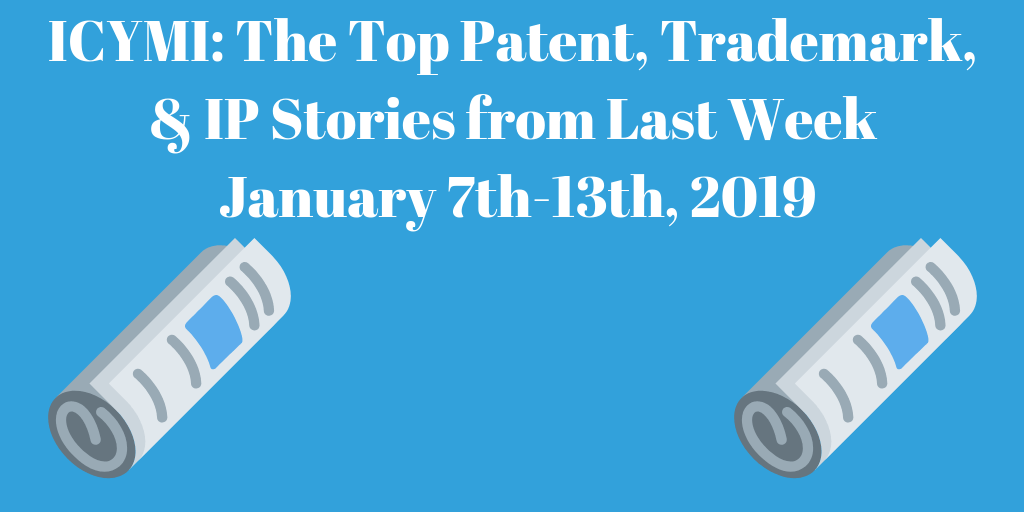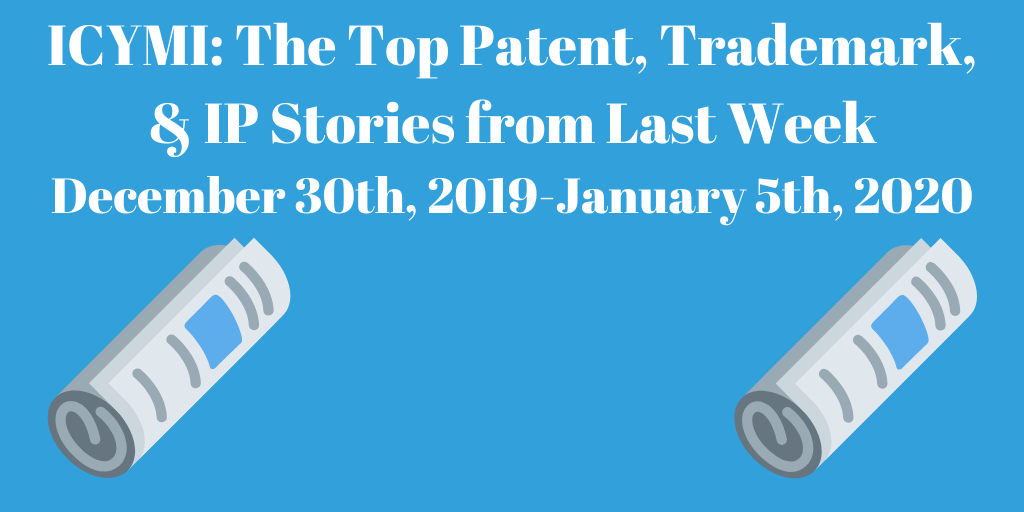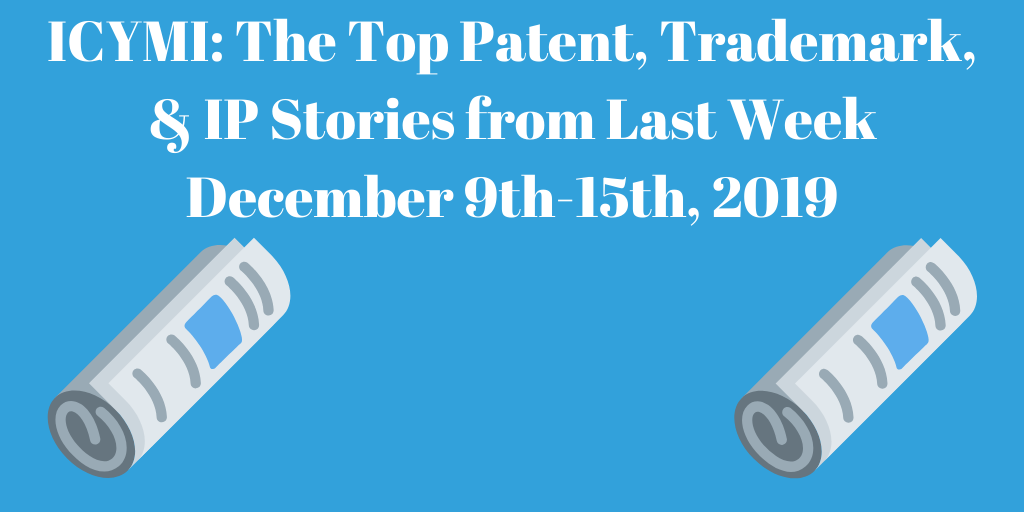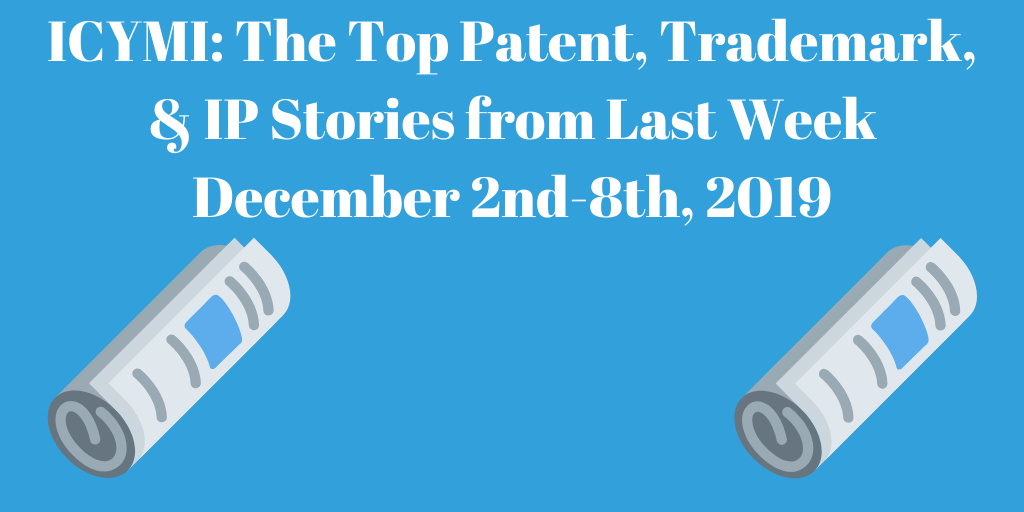Top Patent, Trademark, and IP Stories from Last Week (1/7-1/13/19)
ICYMI: The Top Patent, Trademark, and IP Stories from Last Week (January 7th-13th, 2019)
Every week, we will be highlighting the top patent, copyright, trademark, intellectual property, etc. stories of the previous week in our “In Case You Missed It” segment. The list itself is in no particular order and includes a wide range of stories from the patent world that are informative, noteworthy, or just plain bizarre. The stories included encompass everything from Supreme Court cases to insights into growing industries. Please feel free to comment your thoughts on the stories or share an important one we missed!
1.) “SCOTUS to Decide Whether Ban on ‘Scandalous’ Trademarks Is Constitutional”
On January 7th, the Supreme Court agreed to move forward with Iancu v. Brunetti (Case No.18-302). The case will review whether the Lanham Act’s restriction on registering “immoral” and “scandalous” trademarks violates the First Amendment. The case will effectively decide whether trademark protection can be applied to brands with obscene names.
Erik Brunetti, owner of the brand “FUCT,” was denied his request to register the trademark by the USPTO in 2011, citing the Lanham Act. The USPTO has identified “scandalous” trademarks as those that are “ shocking to the sense of truth, decency or propriety; disgraceful; offensive; disreputable; . . . giving offense to the conscience or moral feelings;. . . [or] calling out [for] condemnation.”
The implications of this ruling could very well lead to an increase in registration of trademarks for ”highly offensive” brands, logos, and images. Keep an eye on this one. To read more about this story, click here (via ABA Journal, January 7th, 2019)
2.) “IBM Tops 2018 Patent List as A.I. and Quantum Computing Gain Prominence”
In 2018, IBM earned a record 9,100 utility patents. This unprecedented number smashed the previous record IBM set in 2017 of 9,043 grants and continues a 26-year winning streak of being the most innovative company on Earth.
The patents themselves reflect the growth of revolutionary technologies in the digital landscape. Included are patents for cloud computing, blockchain, quantum computing, and artificial intelligence- which garnered 1,600 patents by itself. See more of IBM’s patents here. To read more about this story, click here (via Forbes, January 8th, 2019 )
3.) “Jury Decides to Strip Mongols Biker Gang of Trademark Logo”
In a “first-of-its-kind” ruling Friday, a California jury determined federal prosecutors could strip Los Angeles-based Mongols Motorcycle Club of their trademarked logo. The logo, seen on members’ jackets, features a “mongol warrior” on a chopper. It was the same jury that found the group guilty of racketeering and conspiracy last month- responsible for murder, attempted murder, and selling narcotics.
The seizure of the trademark by authorities was done in the hopes of dismantling the group by stripping what was “core to the gang’s identity.” Seen on jackets, patches, and the like of members, the logo was an integral part of the group’s persona. Assistant U.S. Attorney Steve Welk justified the ruling saying members were “empowered by these symbols that they wear like armor.”
The court order preventing Mongols members from being able to wear the logo will still need the approval of a federal judge. Nevertheless, the case will be presumably appealed on the grounds of a First Amendment violation.
After the ruling, attorney for the Mongols, Stephen Stubbs told reporters, “This is the first time ever in U.S. history where the government is banning symbols… It’s a sad day for this country, but the fight continues.” Will this bring up a First Amendment debate? Should the Mongols get their logo back? To read more about this story, click here (via Associated Press News, January 11th, 2019 )
4.) “Are Software Patents About to Make a Comeback? Revised Guidance May Do Just That”
The 2014 Supreme Court case Alice Corp. v. CLS Bank International made certain “abstract” ideas, especially those related to software, difficult to get a patent for. Without the constant fear of lawsuits from “patent trolls,” there was an easier time developing software and getting it on the market.
For developers and companies alike, that prospect was threatened last Sunday when the USPTO released their “2019 Revised Patent Subject Matter Eligibility Guidance” on January 7th.
According to the ABA Journal, these new guidelines will “enumerate what is abstract, thus opening the door to increased software patents.”
The USPTO indicates it will help rid ambiguity from the patent process by grouping together certain abstract ideas such as “mathematical concepts, certain methods of organizing human activity, and mental processes.”
The new changes are sure to bring further debate over the definition of “abstract” ideas. The USPTO is welcoming public comments prior to enforcing the new guidelines. To read more about this story, click here (via ABA Journal, January 11th, 2019)
5.) “U.S. Patents Dip in 2018 as China’s Share Grows”
In 2018, the number of U.S. utility patents awarded declined for the first time in years following a record-smashing 2017. A backlog of applications at the U.S. Patent and Trademark Office has been blamed for the 3.5% decline and numbers are expected to continue on their upward growth this year.
As for who was granted the most U.S. patents, foreign countries combined for 54% of all patents awarded in 2018. Asia held 31% of patents awarded and Europe received 15%. By country, Japan holds the most at 16% while South Korea, Germany, and China each hold less than 6.5% apiece, respectively.
As author Larry Cady points out, the patent activity is growing in certain high-tech industries including computers, telecommunications, and automotive (specifically autonomous vehicle technology). To read more about this story, click here (via VentureBeat, January 8th, 2019)
6.) “Microsoft Leads the AI Patent Race Going Into 2019”
In a presentation on artificial intelligence by Kai Gramke, Managing Director of EconSight, Gramke drew on some staggering insights into the A.I. patent arms race. Since 2010, over 154,000 artificial intelligence patents have been filed worldwide. 29.5% of these are healthcare related, 25.3% “industry-specific solutions,” and 15.7% “AI-based digital security.” Of the fastest growing A.I. patents, A.I.-based marketing is king with a “Compound Annual Growth Rate (CAGR) of 29.3% between 2010 and 2018.”
In the new A.I. patent race, Microsoft is dominating- controlling 20% of all A.I. world class patents. In terms of which A.I. category is attracting the most patents, machine learning appears to be number one. Deep learning and neural networks trail slightly behind. To read more about this story, click here (via Forbes, January 6th, 2019)




